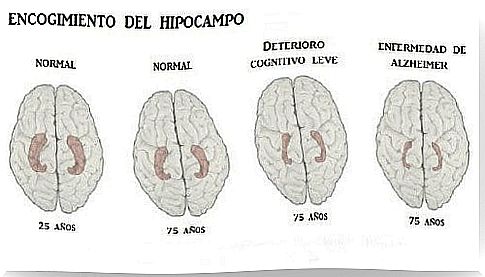Learn To Recognize The Top 10 Symptoms Of Alzheimer’s Disease

Alzheimer’s is a progressive brain disease that directly affects memory, thinking and behavior. In this article, we’ll teach you how to recognize the top 10 symptoms of this disease.
It is one of the most common forms of dementia. A disease characterized by the loss of memory and other intellectual abilities that, consequently, affect the quality of life of those who suffer from this condition.
This disease, which represents about 60 to 80% of dementia cases worldwide, affects more than 5.4 million people in the United States alone. However, it is estimated that by the year 2030 these numbers will increase to 16 million.
Although Alzheimer’s commonly affects the elderly, cases may also appear in younger people in their 30s.
Detecting Alzheimer’s symptoms early is critical for favorable diagnosis and treatments. Therefore, it is very important to be informed about possible primary symptoms and learn to differentiate them from other mental problems.
Main symptoms of Alzheimer’s disease
Sudden Memory Changes
One of the signs of Alzheimer’s disease, especially in its early stages, is forgetting newly learned information, such as important dates or events.
Usually, before this symptom, the person is forced to use notes or electronic devices to be able to remember things.
Difficulty planning or solving problems

Some people lose their ability to develop or plan that involves numbers. Likewise, they may find it difficult to follow such simple things as a known recipe or controlling their spending of money.
Problems performing usual tasks
Often people suffering from Alzheimer’s have difficulties to complete certain daily tasks, both at home and at work.
At other times, they have trouble getting to a familiar place, controlling a budget, or remembering the rules of a familiar game.
Disorientation of time and place
As this disease progresses, people with Alzheimer’s begin to forget about dates, seasons, and the passage of time.
This symptom requires a lot of attention, as the patient may forget where he is and how he got there .
Loss of interest and motivation in the activities you enjoyed before

The emotional changes that Alzheimer’s disease causes can cause a person to lose interest in all the things they once enjoyed doing.
In this way, social isolation and a sudden lack of interest in everything is an indication that something is wrong.
language problems
Alzheimer’s can make it difficult for the patient to follow or participate in a conversation. This is a consequence caused by forgetting words, loss of ability to understand speech and writing.
It’s common to start having trouble finding the right words and the right vocabulary. For example, calling a “pencil” “a writing stick”.
move things around
Forgetting where it belongs is also an early symptom of Alzheimer’s disease.
It can happen, for example, that the person puts the iron in the refrigerator or forgets the place where he left something where he used to leave it.
Loss of ability to make decisions

This disease can cause the person to diminish or lose their ability to make important decisions, both personally and professionally.
Alzheimer’s patients often do not know how to handle amounts of money, are easily convinced and, for example, may end up losing large amounts of money to salespeople or telephone services.
loss of initiative
Lack of interest in usual activities can be an indication that something is out of the ordinary. This is because Alzheimer’s disease makes a person lose the initiative for hobbies, social activities, projects at work or sports.
In addition, changes can make patients unwilling to meet other people.
Mood or personality changes
The mood and personality of people with Alzheimer’s disease are the most notable changes. This both in the early stages and in a more advanced stage of this disease.
They are often confused, in a bad mood, suspicious, depressed, fearful or anxious. In addition, they can become irritated and enraged by everything around them.









